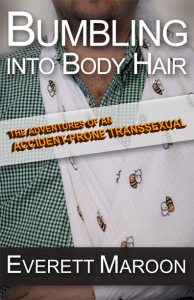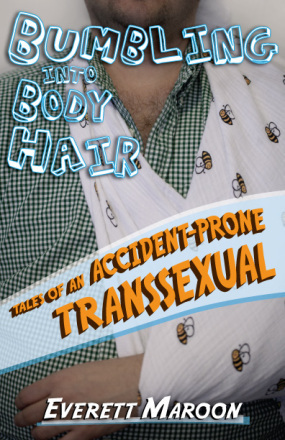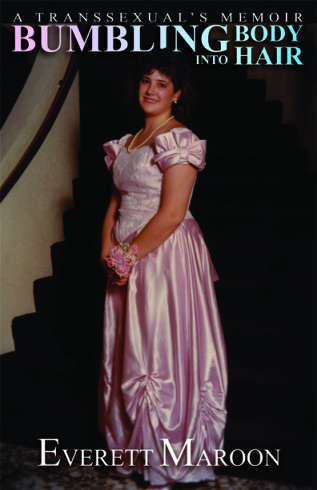Everett Maroon's Blog, page 26
March 21, 2012
5 Reasons I Wrote Bumbling into Body Hair
[image error]Folks don't have to bring it up a dozen times; I get that this is one of people's top questions for me. After all, there are a lot of books out there that depict the author's life in some fashion, and not all of them are memoirs. Certainly very few of them are about people who are gender nonconforming. If we presume I was going to write something and not just make my way through life–which is a big assumption, granted–then there was a specific decision-making process at work here. I picked this story and told it in this way. Perhaps people see memoir writing as narcissistic in the lowest common denominator. I hope my book doesn't strike readers that way, not the least reason because I attempted to describe a story that allows for everyone else's story to be told. Nothing in this book represents anyone else's experience, and in that way, I hope I've done something that stretches beyond vanity. Here's where my motivation lies:
1. I didn't see transition stories told with humor–So much about the process made me chuckle, from trying to find a method that worked for binding, to encountering people who presumed gender-based stereotypes about me (which true, didn't always elicit a laugh), to the ways in which companies "marketed" products to trans people as if we are some captive audience. When I started thinking about the accumulation of these moments and personalities, I realized that gender expectations are ludicrous. They're offensive and impoverished and problematic, but holy cow they're funny, too. So of course transition and being any flavor of gender nonconforming is a struggle, but I knew those books were out there already. What I didn't see when I looked around was a memoir that highlighted the usefulness of a sense of humor.
2. I believe in mentoring in all of its forms–I wasn't one week in Walla Walla before someone senior in the hierarchy at my wife's institution asked me to meet with a trans youth. My first reaction was that I wasn't anywhere near trained to do such a thing over such an incredibly sensitive topic, but then I wondered, if not me, who? I knew that at least I wouldn't tell this individual to transition this way or that, or trivialize whatever feelings were coming up, and so on. Once we developed a rapport, I felt invested in his future, whatever course of action he wanted to take. In part because he was so incredibly quiet, I began telling him snippets of my own experience, which he could take or leave as he saw fit. Nothing of my story was a commandment for him. And the idea of writing down the entire transition, for anyone to read and digest to meet their needs or interest, was born.
3. The more we share stories with each other, the more we care about each other–I sound hopelessly idealistic, I know. (See my post on optimism.) Humanizing works, though, at least for those who don't have a huge stake in remaining adversarial. I understand that for non-trans people, it's difficult to wrap one's head around the idea of changing something so central to themselves, but perhaps transition is not entirely different from the experience of standing up for oneself, or going against the grain of culture more generally. And memoir means that there's an actual person beyond the pages of a book or blips on the ebook screen. Somebody personifies this journey–and I say that absolutely despising the word "journey"–and that can bring home the need for more acceptance, even if we can't all walk in the same shoes.
4. It was a project I could champion above all others–I write other things, certainly. Many other things, heck, probably too many. Genre fiction, short and long form. Food writing. Investigative journalism on Yelp's shady business practices. But this project, which I call "the little memoir that could," this project has a special place in my heart, and not because it's my story. It may represent an earlier version of me, but the issues it brings up like self-doubt, getting stuck in a bad relationship, fearing for one's future, and the like, are common experiences. Laughing at needing a sex change is on one level, laughing at having a need, period. And as debut books go, a humorous memoir about a being trans is strangely perfect for me.
5. I needed to tell this story so it would shut up and let me work–I've said before that stories for me are like precocious toddlers pulling at one's trousers. Look at me, look what I can do, lookeeeee. The memoir yanked a lot harder than the other stories at the time, for most of the reasons already given. It is the case that even when I spontaneously came up with other story ideas–fictional ones at that–they were quick to step aside so I could get to the business of writing and revising. Yes, the memoir was my alpha dog.








March 19, 2012
Capture the Flag
 It should come as no surprise to anyone that getting my hands on a copy of my own book has been something of a debacle. I've been reading through the manuscript for the last couple of weeks wondering which sections I should offer up at my inaugural reading in Portland this weekend. For me and my easily tired eyes, scrolling on a screen works less well than flipping through actual pages. I'd rather hold sections open with pens and fingers and jump around to plan out my entertainment strategy than make electronic notes on my tablet. And I'm a big fan of technology. Just not for this purpose.
It should come as no surprise to anyone that getting my hands on a copy of my own book has been something of a debacle. I've been reading through the manuscript for the last couple of weeks wondering which sections I should offer up at my inaugural reading in Portland this weekend. For me and my easily tired eyes, scrolling on a screen works less well than flipping through actual pages. I'd rather hold sections open with pens and fingers and jump around to plan out my entertainment strategy than make electronic notes on my tablet. And I'm a big fan of technology. Just not for this purpose.
I dropped onto Amazon on the first day of sale and noted that I'd have to pay almost as much for shipping as for the book itself if I wanted to get it in time for our trip to Portland. And then I saw it, a little glimmer of a link–a free month-long trial for Amazon Prime. It was my knight in brilliant armor, promising me an easy, free delivery by Tuesday. I didn't think twice before clicking and shoving in my credit card number, but I did remember to give myself a reminder to opt out before the 30-day witching hour would hit me up for the $80 fee. Thank you, iPhone, for money-saving reminders.
In a blur of clicking I'd ordered my own book, even though I knew I was soon to rendezvous with 50 more of them at the hotel in Oregon. Patience be damned! This way I'd get a copy a day earlier and I'd help keep my sales rank that much closer to the cream at the top of Amazon's 8 million book list. I shudder to think what the bottom hundred titles are. No, don't search for it–it's better if none of us know that sad reality.
Because I was already obsessively reloading the page for my memoir that night, when I was for a moment, nudged between Portia de Rossi and Meredith Baxter's autobiographies, I looked to see if my book had left its warehouse yet to make the trek to me. Susanne took one look at the screen and said, "Honey, you sent it to our old address."
There it was. The damned Liar House. The house with the invisible electrical panel we never found. The one where the bathroom on the second floor rained into the kitchen for months before the super agreed to send in a plumber. The house that reeked of cat urine and had mushy walls. The adorable on the outside, falling apart on the inside LIAR HOUSE. I hate this house.
It's a little Cape Cod style home, a mere 5 blocks from where we live, right across the street from Susanne's office, which yes, gave her the shortest commute of any non-telecommuter I've ever known. But 1-minute walks to work did not justify the hell that was living in this house, with its $300-a-month winter heating bill and total lack of air conditioning, and students constantly meandering across our lawn. It did not justify living next to a half-assed recycling center where people left all manner of detritus to blow on same lawn or decided that our personal trash bin should be a fine fit for their most stinking garbage.
I'd sent my sweet book project to that house.
Fortunately enough, we knew who the new occupant was, because she is a visiting professor at the college. Susanne was sure she was away for the campus spring break, so I took to stalking the house, driving by slowly and menacingly in my bright blue Honda CRV. Seeing that the Amazon site claimed my book was "out for delivery," didn't stop me from waiting for a "delivered" notification, because the US Postal Service has let me down twice in a row now, losing two packages I've sent to other people. No, I wanted my eye on the prize.
Walking up the first time, I parked Emile, tucked in his stroller, in front of the Liar House and saw that the Sunday paper was still on the front lawn. I picked it up and dropped it under the mailbox, next to the front door. Knock, knock. Figuring I could alert the professor to my little delivery mix-up, I waited for her to come to the door. Her car was parked out back, noted Susanne, who turned and walked to her office. Thirty seconds went by and no answer, so I decided she wasn't home, what with her commute being one minute. I dropped Emile back at home and went to work a couple of hours later when the nanny showed up for her 3-hour shift.
I drove by the house and still, no package. But what if it had come in the meantime? I dashed up the front steps again and rapped the door. Only the tired sound of a weak breeze greeted me, leftover fall leaves rustling in the street gutter. I called Susanne as I walked back to the car, asking if she could email her colleague, which she'd been hesitant to do on Saturday. That's when I saw the figure behind the dining room picture window, watching me from inside.
Creepaliciousness! She was a tiny, birdlike version of Norman Bates, her eyes set on mine but somehow refusing to acknowledge the contact. I backed away, concerned suddenly for my safety. In my car, I cried out to Susanne that I felt icky all over.
I went to work and again, a couple of hours later, took a break before a late afternoon meeting, my stomach rumbling because I'd forgotten to have lunch.
I admit I was afraid to knock on the door again. I told myself I'll just idle at the corner, where she can't see annoying me, and try to identify if there's a box under the mailbox.
My timing couldn't have been more perfect, for there was the letter carrier! I was a dog unleashed in a bacon factory. I honked my horn and waved him over–he was holding an Amazon package. I squeaked seeing the familiar smile logo. That smile was MINE.
"Hi," I said to him, grinning in some approximation of a lunatic, "That's my package. Here." I showed him my driver's license, which I cleverly never updated to reflect my current address, just for these sorts of occasions. He read my name and the street number, and handed it to me.
Again, the lonesome dark outline of a person looking out from her shades. So there! I have my freaking book and you can't claim it!
I sped away and found Susanne, now working at our favorite coffee shop, and we celebrated over the trade paperback. It had a heft I quite enjoyed noting.
And yes, I deleted all previous addresses from my Amazon account.








March 17, 2012
The Number Games
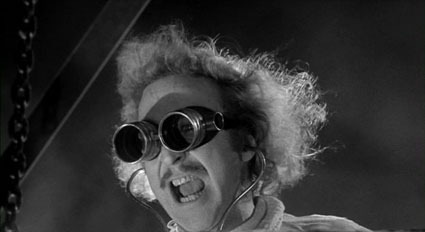 My editor told me yesterday, "Enjoy the last day of your life where you're not checking your rank on Amazon." I smiled and sighed, because I knew she was right. Quadruple-checking any measure of my likability is now a habit with me.
My editor told me yesterday, "Enjoy the last day of your life where you're not checking your rank on Amazon." I smiled and sighed, because I knew she was right. Quadruple-checking any measure of my likability is now a habit with me.
I blame all of the people who've advised me to build my social network and online presence, two terms that sound professional but that have wound up occupying my most junior high of insecurities. How many friends on Facebook? How many people clicked on the link to my latest blog post? What's my most popular article this week? How do my numbers stack up over last month? Last year this time?
To a great degree, following these data is a ridiculous process, because they're so shallowIf I want to pay WordPress extra money I can see some more under the iceberg, but I still have to make guesses about which of my fan base is interested in which topics or posts or Tweets. I can set up short links using bit.ly and get some country data on the work I leave around the web, but then I'm paying more attention to popularity than my writing itself, and since the baby, my time is too short to worry about such things.
Enter the Amazon ranking system, which is enigmatic on purpose, and now all of my numbers are generated in direct comparison with other authors. I'm already competitive as people go, but last night I found myself trying to stare down Portia de Rossi's memoir. At one point Bumbling was number 5 on the gay and lesbian memoir/autobiography Amazon list. I made a few cracks about between de Rossi and Meredith Baxter. Yuk yuk. My memoir streaked like Icarus toward the top of the overall chart, hitting the 2,000 mark.
I texted my publicist, because the cynical me kicked in: "It's nowhere but down from here, folks!"
Perhaps I jinxed myself. Soon enough, I fell to number 6. I told myself, Well, Jeanette Winterson has the top two spots with two versions of the same book, so I'm really still number 5. And then myself responded with, Which made you number 4 before, dumb ass. So that's when I realized I was having a conversation with nobody and sweating my introductory numbers. Overall rating: 3,200. Then 3,999, which became 4,780. Now I'm in the low-5000s. Number 8 in the same list, with Baxter in the third spot. I wondered if she saw I'd displaced her earlier and bought a flat of her own book. Celebrities can do that, you know.
My friends and a few fans pinged me to say they'd bought copies of my book. I got teary realizing that this project means as much to some others as it has to me. I could hear Gene Wilder proclaiming, "It's alive! Alive!"
I still haven't held one of my books. I will rendezvous with a big box of them next week in Portland, gearing up for a reading of Portlandia proportions. But I did pop online to Amazon last night and buy one for myself. Looking at the tracking, it's somewhere west of Kentucky, making its way to Walla Walla. I've never measured by writing in miles traveled, but perhaps that's a good metric, because it's purely cumulative. I won't have to feel some challenge from Chaz Bono or Ellen's life partner.
Though it would be nice if those folks could buy one of my books and help me a little on the Amazon ranking chart. You know, to build community.








March 14, 2012
By Way of Cover Design
Authors don't usually have much say in the covers of their books, idioms about judging books notwithstanding, but in the digital revolution sometimes conversations about cover design make it to the writer, who naturally has opinions about the thing. Trouble is, nobody else in the publishing house really cares about those opinions, and maybe it's best if they ignore us writers. We may be too invested in relaying a scene or theme from the book as opposed to creating a visually appealing cover that will sell books. After all, we're wordsmiths, not graphic designers.
Unless we've also done graphic design work (cough, cough). But even then our input is presumed to be minimal.Like I mentioned, the digital world has crash-landed onto the publishing industry, and the cloud of smoke is still in the process of clearing. So where 10, 15 years ago cover designers only concerned themselves with how images and typeface looked on one kind of card stock or another, now they have to design for real world book covers and tiny thumbprint images that one can find on Amazon, Goodreads, and other book selling Web sites.
Walk down any cereal aisle in the grocery store and you'll see a lot of orange boxes of cereal. Not all of them, certainly, but many of them. That's because marketers have noticed people are drawn to orange and yellow cereals. Certainly those rules don't hold true for say, diamond ring boxes. Consumers have expectations, in other words.
Notice we've drifted from the writing in books to the color of Peanut Butter Cap'n Crunch. For publishers, our work is a product crammed in an aisle with thousands of other products all calling out for our attention and money. We may talk about our art or our mission as writers, but books nobody knows about are books nobody reads. I get it: to be noticed one must be noticeable.
My cover started out as my impression of what the cover should look like, and this state of affairs came about because I know the cover designer personally. So while I was "vacationing" (or rather, feeling terrified) at the haunted Hot Lake Hotel in La Grande, Oregon, the designer and I did a little film shoot. In the old surgery room of the once-sanitorium. Creepy. So it was perfect for the cover of a humor book. Right?
The idea was to communicate the klutziness and trans-ness of the book, as well as the funniness. So we started with me in a green gingham shirt and a makeshift sling over my arm. Because bumbling is in the title, the sling I used was one of Emile's swaddles, replete with bumble bees. Oh we writers are so freaking clever! One of the early versions looked like this:
Funny, yes, but we kept playing around with the font and the layout. It looked a little busy, and maybe not "professional" enough. At some point the elements got moved around until we had this:
Ha. Now this one I find super funny. Only problem was, it wasn't readable or visually understandable when viewed as a thumbnail.
 Okay, I get it. I wanted to resist, and say something like, people can read Bumbling and Transsexual, so what more do they need? I wanted to point out that this tiny image is going to be presented next to the printed title and a short description of the memoir. I was attached to this image, I wanted to see stacks and stacks of this book with my silly digitally enhanced chest on the cover—I don't have that much chest hair, folks.
Okay, I get it. I wanted to resist, and say something like, people can read Bumbling and Transsexual, so what more do they need? I wanted to point out that this tiny image is going to be presented next to the printed title and a short description of the memoir. I was attached to this image, I wanted to see stacks and stacks of this book with my silly digitally enhanced chest on the cover—I don't have that much chest hair, folks.
A new idea was born in a meeting with my editor, the publisher, my publicist, the cover designer, and a marketer. Why not show a picture of me from my childhood? I went through the crusty photos I had from my childhood, looking for a picture of me frowning while wearing a dress. There certainly are enough of those out there, because I was approached with a number of dresses, I went to Catholic school where I had to wear a skirt every day, and I hated all of those non-trouser outfits. So fine, I poured over picture albums. Every single shot had a problem—the sun cast some weird light effect in the corner, I was half-standing behind another person, I'd just gotten a perm (no way is that crap going to light up the cover), or the picture was uncroppable. And then I came across my prom photo.
Now then, I had to smile for this photo, but perhaps there's a tension in the image. It's a forced smile, done on command from the Olan Mills photographer. My mother had spent 5 hours on my hair and makeup. My date was already flirting with two other girls at prom. I hated wearing heels. Especially pink heels. So now I have a new cover, not of my design, but certainly borne of my own experience. Here it is.
Fifteen design versions. Xena help us all. This baby is done!








March 13, 2012
Me Versus Spider
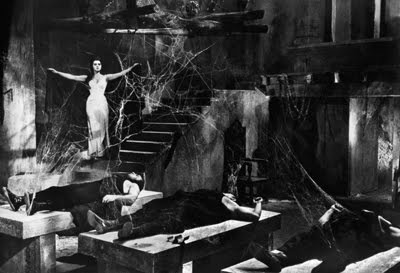 On the Cynthia Nixon episode of Law & Order: SVU, her character remarks, "You're never more than six feet away from a spider." I really didn't care to know that, true statement of fact or not. As bugs go, spiders are not my worst enemy. That mantle goes to the disease-spreading cockroach. Fortunately I haven't spied any of those since moving away from the nation's capitol. Out in DC broad flat roaches skitter across the sidewalk in the summer months, sensing oncoming foot traffic. It's like a creepy, disgusting version of the parting of the Red Sea, except there's nothing approximating divine intervention going on.
On the Cynthia Nixon episode of Law & Order: SVU, her character remarks, "You're never more than six feet away from a spider." I really didn't care to know that, true statement of fact or not. As bugs go, spiders are not my worst enemy. That mantle goes to the disease-spreading cockroach. Fortunately I haven't spied any of those since moving away from the nation's capitol. Out in DC broad flat roaches skitter across the sidewalk in the summer months, sensing oncoming foot traffic. It's like a creepy, disgusting version of the parting of the Red Sea, except there's nothing approximating divine intervention going on.
But if Walla Walla is free from mosquitos and cockroaches, both of which love humidity, then it has more than its fair share of spiders, some of them extremely poisonous. We've got rattlesnakes out here too, because we're in dry tumbleweed territory. The snakes, however, don't hang out in corners of our home—other than a friend's dog who got bit during a hike on a low ridge, I haven't heard of any rattlesnake encounters since I moved out here.
Spiders are another story. They've totally taken over the stand-alone garage, which from the outside appears cute and appealing, like maybe it's not a garage but some kind of outbuilding, a writer's studio, even. Just opening the side door makes that dream dissipate like a fart in the wind, for every surface inside is dusty, and strewn with old webbing. From the old concrete floor to the visible rafters, it's like a 1950s B horror flick. Or perhaps a scene from an Indiana Jones movie.
I can look at the garage—which I use sparingly, mostly when I perceive inclement weather is on the approach and want to protect the family car—and see that this is what they want from our house. Every week I break out the vacuum cleaner and suck new webs out from their homes on the crown moulding. Out from the track lighting in the kitchen, the picture windows in the living room, the 1940s-era heat duct grates. From behind picture frames and underneath the entertainment center, I find myself on a mission against the arachnoids who would quietly encase us in sticky silk. I'm not afraid of spiders per se (it's those city roaches that give me the heebee jeebees), but I'd rather they do their insect-eating work outdoors.
What am I saying? Our porch is full of webbing, only the porch webs are caked with desert dust. It's no wonder they'd rather set up shop in a protected environment.
I realize that the spiders are onto me and my mission of living web free. No sooner do I suck a room clean than I return, after putting all of the vacuum parts back together and storing the machine away, than I see a tiny speck on the ceiling, dangling from a couple of inches of freshly made thread. I imagine that it's sighing at me, thinking, This house sucks. I'm just trying to get some dinner and that fat guy keeps destroying my net.








March 6, 2012
Life Without Filters
 These days I use chronic sleep deprivation as a tool. It's my excuse when I can't think of a particular word. It's my justification for taking an early afternoon nap. It's my benchmark for whether the latest set of nighttime hours aided or subtracted from my sleep deficit. It's my metaphor for 2012, in which I measure achievement in between unintended bouts of sleep. At some point I may actually drool into my keyboard and short-circuit my laptop. Anything is possible.
These days I use chronic sleep deprivation as a tool. It's my excuse when I can't think of a particular word. It's my justification for taking an early afternoon nap. It's my benchmark for whether the latest set of nighttime hours aided or subtracted from my sleep deficit. It's my metaphor for 2012, in which I measure achievement in between unintended bouts of sleep. At some point I may actually drool into my keyboard and short-circuit my laptop. Anything is possible.
But another effect of not granting rest to my brain is the effect it's had on my frontal lobe. Perhaps my cerebellum is demanding that it operate at peak efficiency so I can like, breathe and blink and such, but my filter for shutting up has gone all wonky. I'm not lecturing passersby as I run errands, exactly, but my big booming laugh is taking more people by surprise.
Last week I left extra early before work because a significant number of my dendrites told me to get a mocha from the patisserie. Not the roastery, not the drive through espresso place on 9th Avenue, but the patisserie. Without enough alertness to remember that the shop wouldn't be open at that hour, I maneuvered the car to downtown, then cursed at the Closed sign, which of course didn't care, it being an inanimate sign and all. Idle at the light on Main Street, then press the accelerator. I figured since I was near the post office now I might as well pick up the mail for the office. About thirty feet past the stop sign I recognized that hey, those red octagons mean something important. What was it again?
No matter. I pulled over to park and fished for my post office box key when I noticed the police cruiser behind me, his blue and white lights ticking at me in my rear view mirror.
Right. I was supposed to stop.
This was when I collected my driver's license, registration, and insurance card. The officer looked at me sternly.
"You went right through that stop sign."
"I sure did."
"You didn't even slow down."
"Nope."
"I was right behind you." As if I should only pay attention to traffic laws when someone with a ticket pad is in proximity to me?
"I saw it after I passed it," I said. "I have a six-month-old baby at home."
I know, I'm going to hell for blaming the baby. And I need to shut up at moments like this. Why wasn't I shutting up?
He took my information, shaking his head as he walked. Great. A few minutes later he came back to me.
"Sir, you don't have insurance for this vehicle?"
"Sure I do." I looked at the card. It had expired the day before. We had brand spanking new cards on the table at home. Vaguely I recalled agreeing to put the new card in the sleeve we keep under the dashboard for just such things.
My waking self would have done it right away, or at least within a few days. My sleepy self eschewed activities like updating proof of insurance, remembering store hours, and adhering to driving laws. I stifled a yawn so I could communicate with the officer.
"I have the new cards at home. We are insured, really."
"Well, I wrote you a ticket, but it's one you can get out of."
I laughed in his face and then nearly peed on my seat because he looked so disgusted with me.
"I'm doing you a favor, sir, the least you could do is appreciate it."
"I do, I do I do," I said, like a bride who can't wait anymore. "I simply thought you made a funny statement. I write comedy."
SHUT UP, said the 3 percent of my brain that was still a functioning adult and not a hebephrenic schmuck.
"This is a ticket about your failure to produce proof of insurance," he said, handing it to me. "Just contest it and go to court when the clerk assigns you, and it will be dismissed. And sir, get some sleep. You have a baby at home, you don't need to get into a wreck."
Truth be told, I don't care to get into a wreck whether I have no kids or if I'm Jim Bob Duggar. I nodded, not speaking. Speaking was not working for me.
I put my information cards back and turned over the engine. The ticket fine as stated was $550. If nothing else happened that day, I needed to send in the notice of contestation, even if I was running on lizard brain.
Now that time had ticked by, the patisserie was bound to be open. I went directly there and bought the biggest mocha they would sell me.
Thinking is a wonderful thing.








March 5, 2012
Fixing House After the Zombie Apocalypse
 At some point, any zombie apocalypse had to move into a new phase–zombies eventually run out of human brains to eat, humans find a way to reverse zombification, thus beginning a new chapter in humankind, or humans defeat the zombie onslaught. Of course there was another option–people dying out completely. But human history has shown us capable of responding to almost any threat, and so we found a way of succeeding even when all seemed lost. So many theories about surviving zombie attacks have focused on battling zombies, avoiding zombies, and discerning whether a loved one has become a zombie, it has largely slipped through the cracks of culture that even zombie doomsdays must end.
At some point, any zombie apocalypse had to move into a new phase–zombies eventually run out of human brains to eat, humans find a way to reverse zombification, thus beginning a new chapter in humankind, or humans defeat the zombie onslaught. Of course there was another option–people dying out completely. But human history has shown us capable of responding to almost any threat, and so we found a way of succeeding even when all seemed lost. So many theories about surviving zombie attacks have focused on battling zombies, avoiding zombies, and discerning whether a loved one has become a zombie, it has largely slipped through the cracks of culture that even zombie doomsdays must end.
And then, if any humans have made it unscathed, it will be time to start living again.
So where to start? Zombies aren't exactly known for their housekeeping prowess, and the National Guard wasn't tip-toeing around to try to stop the onslaught back in the day. Depending on how long it's been since the beginning of the days of nigh, batteries may no longer be able to power any electronic devices, or there may still be a few charged batteries or cans of gas around for such things as chainsaws. Civilian Anti-Zombie groups have sketched together a priority list for powered devices to maximize a home rebuilder's efficiency in making repairs:
Chainsaws
Drills
Wet vacs
Earth augurs
Other powered devices like screwdrivers, walkie talkies, sanders, and finishing tools should not be used if powering supplies are limited, unless their use would mitigate a severe safety hazard for an individual. More important is the list of items NOT to use unless a home or block has been approved as clean of zombie debris. These items are:
Power washers (except those that use steam above 76.7 Celsius or 170 Fahrenheit)
Snow or leaf blowers, or combination blowers
Central heating or central air conditioning
Once a home structure is accessed–many homes still have boarded up doors and windows from when they were used as zombie defense–it must be inspected for structural sound and organic debris that could be toxic. In addition to mold spores, broken asbestos insulation or tiles, and vermin infestation, humans should be on the lookout for necrotic tissue, zombie remains, or whole corpses of mammals. Initial inspection should begin by dressing in protective clothing like that specified for use against zombie attacks. Additionally, human home rebuilders should wear gas exchange masks to ensure the air they breathe is free from contaminants.
To start with, homes should focus on being self-contained. Septic systems, wood pellet furnaces, well water are all good choices for isolating the structure of a home from its neighbors. This should help minimize exposure to any after-effects of the zombie invasion and lower the chances that remaining contaminated material will come into contact with any residents. On the other hand, neighborhoods need to plan which homes they want to re-settle; rather than the haphazard renovations that hindered New Orleans' recovery after Hurricane Katrina, whole blocks should come together to sanitize and rebuild, so that people moving in can achieve a sense of security and community. More importantly, worse-hit neighborhoods will be easier to reacquire as community gardens or activity centers like libraries, gymnasiums, and education facilities.
Free consultation on rebuilding is available from the After Zombie Partnership, an effort of private businesspeople and federal government. To apply to adopt a home and for guidelines on rehabilitating it, contact your local planning board.








February 29, 2012
Overwriting on Purpose

It's a good thing for us writers that we come at our craft differently, in our own ways. Some folks dwell over every sentence, taking a long time to make it through the first draft of a manuscript. Others of us are barnstormers and get languid later, during rewrites. We talk about writing skeletons and adding on, or finding ourselves in a process of paring down our original prose like a sculptor looking for the form inside that block of marble. It's good that we take our individual approaches because we get individualized end products out of this, and a diversity of voice is a good thing for readers, much as some critics insist on all literature sounding the same.
I've noticed that my stories themselves have their preferences toward being written in a certain manner or other. I shot through the first 150 pages of The Unintentional Time Traveler, and then slogged through the next 135. Rewrites came to my aid to help smooth the narrative out, thank goodness. My latest work-in-progress is like wading through golden molasses, every step of the way, but I'm liking the base writing more than I usually do.
One goal I have on every project is to hypervisualize each scene in the story. List every object in the room, who lives behind the doorways on the block where the protagonist lives, what the weather was like the day before, whatever will get me into that universe. After all, if I walk into my kitchen and need one of my 500 gadgets for something, I know immediately where it lives. Lemon juicer? Short drawer to the right of the sink. Silpat, bottom wide drawer in the corner. Dutch oven, under the microwave. I aim for knowing my fictional world that well, or I risk not writing it honestly enough. Speaking of honesty, I also have a pet peeve against inconsistencies in a text. So if someone has run to the south end of a house to escape a pursuer, then don't put the glaring sunset in their eyes. Knowing how buildings are oriented = good planning.
I've written before about developing good back story in order to understand the motivations and intentions of the characters, and be able to write them as fleshed-out people. There are more benefits to creating a thoughtful universe more generally — the setting will be more interesting, give you more to work with in the way of character action, help you see plot points better, and perhaps even improve the direction of the story.
That said, just like back story, a lot of this writing will make its departure before the manuscript is finished. Because readers don't need to know that the bench at the bus stop has a faded photo of a real estate agent who hasn't worked that neighborhood in the last decade, unless they do. Is the character afraid of sitting in rickety chairs? Folding chairs? Hammocks? Do they flinch at the smell of sandalwood incense that assaults them every morning on their walking commute to work? Kick a pebble out of the crumbling concrete? Perhaps these elements aren't germane to the story, and can get tossed, relegated to the writer's brain, but anything that's written moves the story forward, even if it doesn't live to the end product.
Sometimes I'll sketch out and write a scene that takes place between the beginning and end of the tale but that doesn't need to present in the telling of things. I want to know what was said, to feel the words coming out of the characters' mouths, but I could hide this moment from readers for a variety of reasons, including:
Building suspense
Deciding it's not important enough to show directly
Saving it for later disclosure
The devil may be in the details, but so is the storytelling deliciousness. Consider writing thicker prose to get a closer sense of the world you're creating, even if some of that prose will fall to the cutting room floor. It's still working for your story.








February 26, 2012
Narrative Transitions
 I bring this up today because ineffective transitions killed my most recent back-and-forth with an agent on a novel of mine. You'd think an individual with personal experience transitioning would handle these story shifts better, but apparently, they're two different things entirely.
I bring this up today because ineffective transitions killed my most recent back-and-forth with an agent on a novel of mine. You'd think an individual with personal experience transitioning would handle these story shifts better, but apparently, they're two different things entirely.
Now then, with this case in question, much of any transition in the book had to do with the main plot point, uncontrolled time travel. With the protagonist at the mercy of something–or nothing–pushing him between the Prohibition Era and the 1980s, in different geographic locations, it was up to me to make sure readers could come along for the ride. A couple of my beta readers who looked at an earlier version of The Unintentional Time Traveler noted some bumps in the last third of the novel when time jumps occurred. So I sat back down with the manuscript and examined the language, the necessity of those movements.
Like I've said countless times in this blog, I'm a fan of rewrites. I love adding new layers, fixing squeaky parts, and finding little themes I didn't realize were there as I make pass after pass through the prose. But these transitions were another issue. They read (past tense) to me and today, they still do. So there's something I'm not noticing, if the agent's assistant didn't even recognize the protagonist's final choice in the story.
I abhor over-explanation. We car drivers plunk ourselves behind the wheel all the time, never questioning the state of the pistons or the platinum usage of the catalytic converter. When writers overdo it, readers get bored. On the other hand, when not enough detail is provided to readers, they get lost, or worse, misinterpret what's happening in the story. So I, like many others, try to balance the level of detail, considering all of the following:
Is holding back on an element or revelation important to building suspense?
Does the protagonist or reader need to know this detail right now?
Does this piece give us something important about a character, universe, or plot arc?
Another level of confusion in my novel is the unorthodox treatment I give to gender. The agent's assistant didn't understand that I believe gender presentation and identity are fluid, devices we slap onto people to help the rest of us make sense of the world. So I ought not be surprised that she didn't follow me throughout the text as the main character basically transitioned gender-wise. The more rules a writer breaks, the more explaining will have to take place. Here's an excerpt from one of the time shifts:
I woke, feeling a heavy blanket over me that smelled of flowers. Detergent. I fumbled on my nightstand for the matches I'd left there and instead my fingers found something hard and rectangular. As my eyes adjusted to the dark I saw glowing numbers: 5:35. I was home, in my bed. I racked my brain thinking back to where I'd been last. Chased by Prophet Traver's henchmen, fleeing with the Underground to the farmhouse, seeing angry flames licking up the stairwell and my mother looking at me like a ghost from her bedroom window—my mother. She was in the next room, with my Dad. I was Jack. Jack, I was me again. I put my hands on my chest, feeling skin that could only be described as dry, covering pectoral muscle. I wasn't sure anymore which existence haunted me more.
Readers are adept at filling in the gaps of a narrative, but unexpected twists and turns need to be painted by the writer. I got tired of trying to open every temporal jump with blinding light, and I wanted to note that our hero (heroine) gets used to leaping across time–sometimes even in his sleep–to some degree. I think about it in that way that we stop noticing the little things when we develop familiarity. My 30th subway commute in DC, for example, saw me no longer staring at every station's name on the tunnel walls because I knew by second nature that it hadn't been long enough since I sat down to make it to my destination. Or driving the same path to the grocery store, by near instinct now I avoid all of the potholes in the streets, no longer needing to concentrate on avoiding them. If I haven't gotten my readers accustomed to the time travel by the fifth such action in the text, I'm not doing my job.
I went back to my prose and highlighted where I could spend more time emphasizing the movement of leaping through eras. I reviewed other novels (Kindred, Blackout, Somewhere in Time, The Accidental Time Machine) and lo and behold many of them use very brief transitions if they don't employ a lot of dials and knobs and devices. So my goal now is to keep it as minimal but as clear as possible when a shift occurs, and look to other sections of the text, like character motivation, dialogue, and the original exposition to help readers through the time travel and the gender development. With a firmer grounding up front, there need not be as many erroneous interpretations later in the story.
Rejections are never enjoyable, especially after a request for a full manuscript. And in this case I was something other than amused to see that the agent's assistant greeted me as "Richard," but I can use the takeaways from her reading experience to retool notable sections of the narrative, and get back to querying after that.
So it goes.








February 25, 2012
Where Ghosts Go to Lounge
 I shouldn't write about this while I'm still here. It's creepy enough in these hallways at night, but right now the sun is still up and I can pretend I won't be a nervous nellie after dark.
I shouldn't write about this while I'm still here. It's creepy enough in these hallways at night, but right now the sun is still up and I can pretend I won't be a nervous nellie after dark.
We've driven out to the Hot Lake Hotel in La Grande, Oregon, former resort and when that didn't pan out, sanitorium. Now former sanitorium, as that didn't last, either. Three hundred plus windows in a blocky brick frame, at one point all blown out, the wind and rain assaulting the structure for decades, folks round these parts had given up on the building as part of a bygone era when the train stopped here and let off hundreds of passengers. La Grande, like Walla Walla, was a destination in the pioneering West, until the population centers crystallized along the coast and sucked the life out these inland cities. Portland and Seattle became economic black holes for the likes of places at the edge of smaller mountain ranges, and to this day, there is much grumbling about people here getting the short end of the stick.
Right about the time one of the resort-turned-medical center buildings fell down from disrepair, a couple–he from Walla Walla and she from Colorado–bought the property and began renovating it. The community congealed for the effort and now there is a functioning hotel once again, its history front and center in every inch of the building. Our suite proudly shows the brick and mortar behind the plaster wall; ceilings have been raised and the lifeblood of plumbing pipes is exposed, as if we'll be more settled to know where the hot water that fuels the radiators is streaming, exactly.

For Hot Lake Hotel's appeal, other than its mysterious and colorful past, is the sulfur lake at the front entrance. Wafts of pungent steam rise endlessly into the sky, creating a spooky aura around the property, as if it needed anything to add to its entertaining creepiness. For some time much of the hot spring has been funneled into soaking pools where guests can lounge for an hour at a time. I sat in an overgrown yurt last night, wondering if customers in years past tried to fend off tuberculosis in these waters. And when that failed to serve as a cure for what ailed them, they could head to the third floor surgery room, complete with viewing gallery. As it happens, this was the site of the first hospital in Oregon. A few rooms away from the operating theater, which is the first surgical room I've ever seen with wraparound views of mountains, is one of the first X-ray machines ever used. What was cutting edge medicine is now an artifact of horror, or at least film noir.
To enter the lobby means walking past a flock or two of peacocks and hens who appropriately enough, squawk like the muffled cries of babies, so much so that my partner kept waking up at night sure that the baby was not smothering himself to death in his portable crib. So much for the wisdom of buying a yard sale bassinet. A skittish cat roams the hallways, mewing for attention but staying well out of petting distance, so my overactive imagination conjectures that she's some spirit embodied in a new form–maybe the ghost of the gardener who committed suicide, or a former sanitorium patient who can't move on to the hereafter properly. Cargo trains rumble by on the tracks once built to bring patrons to this site, a low rumbling noise accompanies each of them that cuts through the shrill wind trapped between the hotel and the bluff behind it.
Laura Gibson, a wonderful indie singer and songwriter, featured the hotel in her latest album, which the folks at NPR just loved. My brother-in-law was on the set of the music video shoot, contributing a lot of the footage to the final cut of the video. And that's how we find ourselves here on a mini-holiday. A creepy, fascinating holiday. Maybe I'm just unsettled by 1912-era fixtures and furniture, as if this structure too could sink to the bottom of the Atlantic Ocean, even given its landlockedness and lack of proximity to the East Coast. I've been in lots of older buildings that have watched their peak usage pass them by.
But it never gets any more comforting to inhabit them in their afterlife.









